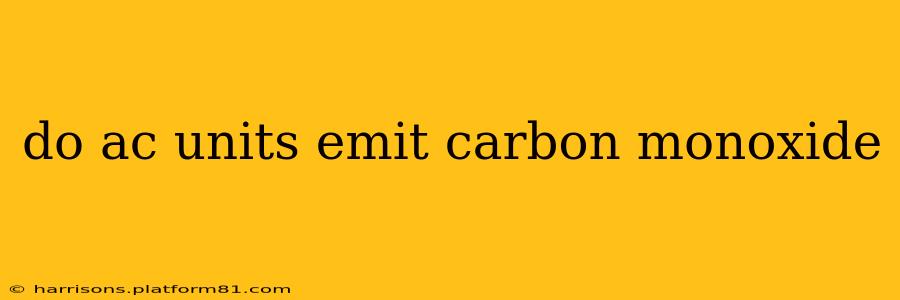Do AC Units Emit Carbon Monoxide?
The short answer is: Generally, no, air conditioning units do not emit carbon monoxide (CO). However, there are some crucial exceptions and important safety considerations to keep in mind. Understanding these nuances is vital for ensuring your home's safety and well-being.
Unlike gas-powered appliances like furnaces or stoves, most modern air conditioners use electricity to operate. This electrical power runs the compressor, fan, and other components, generating no combustion process—the primary source of carbon monoxide. Therefore, in standard operation, your AC unit should not produce any significant amount of this deadly gas.
What About Older or Faulty Units?
While rare, older or improperly maintained AC units could potentially produce small amounts of CO under specific circumstances. This is typically due to issues with:
- Gas leaks in older units: Some very old air conditioners might utilize gas-powered components. If there is a leak in the gas line, carbon monoxide could be released. This is extremely unlikely in modern units.
- Combustion byproducts from auxiliary heating: Some central AC systems incorporate auxiliary heating elements, which often burn natural gas or propane. A malfunction in these heating components could lead to CO emission. Regular maintenance and inspection are essential to prevent this.
- Blocked vents: Poorly maintained systems, especially those with gas-powered components, might experience incomplete combustion if vents are blocked. This incomplete combustion can lead to CO buildup.
How to Ensure Your AC Unit Isn't a CO Hazard
Regular maintenance is your best defense against any potential CO dangers, regardless of your AC unit's age. This includes:
- Annual professional inspections: A qualified HVAC technician should inspect your system yearly, checking for gas leaks, ensuring proper ventilation, and testing for combustion efficiency.
- Regular filter changes: Clean air filters improve airflow and prevent overheating, which could potentially lead to malfunctions and CO production.
- Addressing unusual noises or smells: Strange sounds or unusual smells emanating from your unit are warning signs that demand immediate attention from a professional.
- Installing carbon monoxide detectors: Even without a gas-powered AC unit, it's crucial to have functioning carbon monoxide detectors throughout your home. These detectors provide an early warning system in case of any unforeseen CO leaks from other sources.
What Causes Carbon Monoxide Poisoning?
Carbon monoxide poisoning is a serious health risk that can be fatal. It happens when you breathe in too much CO. Common sources include malfunctioning furnaces, gas water heaters, and poorly ventilated fireplaces. Symptoms range from mild headaches and dizziness to nausea, vomiting, and even loss of consciousness.
Are There Any Other Gases Emitted by Air Conditioners?
While CO is the primary concern regarding toxicity, air conditioners might emit other gases, although generally in much smaller amounts. Refrigerants, for example, can be harmful to the environment if leaked. However, these refrigerants are typically not toxic in the same manner as CO.
In Conclusion
Modern air conditioning units are generally safe and do not produce carbon monoxide. However, regular maintenance and the installation of CO detectors are vital precautions to ensure the safety and well-being of your household. If you suspect any problems with your AC unit, contact a qualified HVAC technician immediately.
